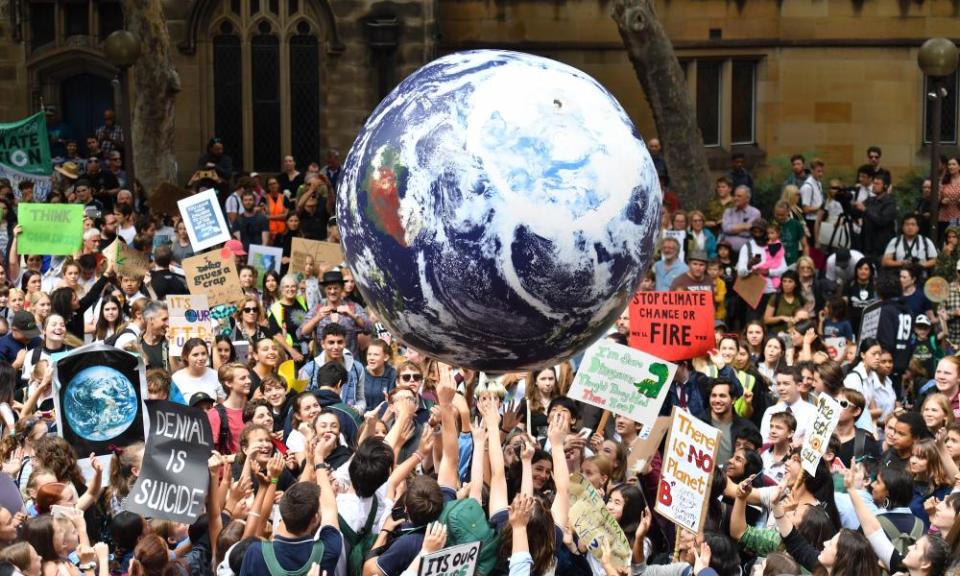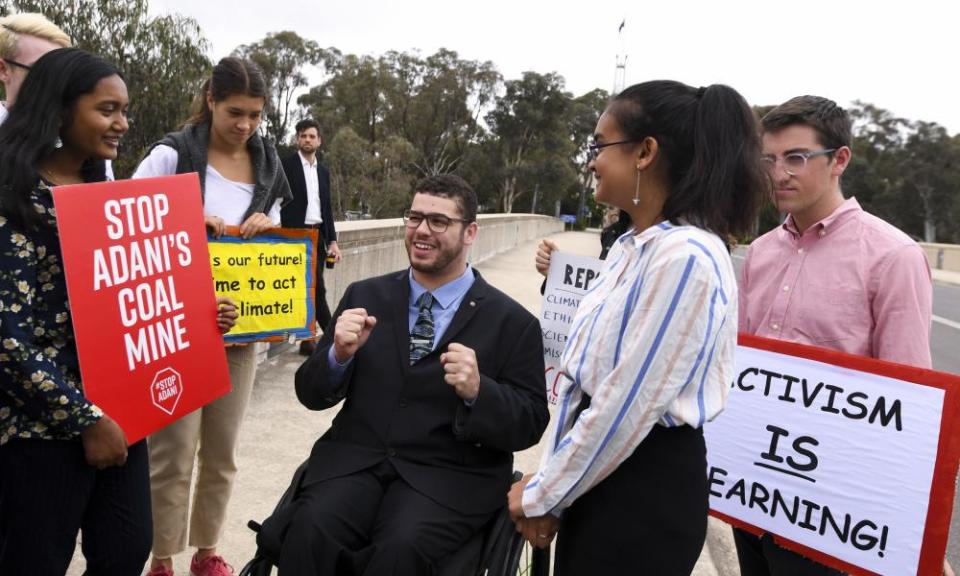Taking it to the streets: 'The movements making noise are being led by young people'
When Alice Rummery sees a problem, she has one overriding thought: “What are we going to do about it?”
That’s been the driving force of an activism that was first ignited as a university student in 2018 when she was a critical part of a campaign for women’s safety in cities. Trained and supported by Plan International’s Activist Series, she worked to enable women in five cities in the world to map precisely where in that city they felt safe or endangered. Now, she is working in the public service, tasked with implementing the Women’s Safety Charter for the city of Sydney and taking the momentum of her campaigning work into practical application.
“That’s the hard part of activism: making sure that people are held accountable to the decisions they make,” she says.
Rummery remembers the “blue sky thinking” of her younger activism, untainted by bureaucracy. As a young bureaucrat now, her activism has shifted track. She can see the barriers to social change more clearly, but she has hope. Young people around her are entering the workforce, with expectations and ideals about affecting change, and she is excited at what changes they can bring from within the system – what impact she can have from within.
“I can see making really good changes in the public service,” she says. “I can’t envisage a future where I’m not fighting for something.”
Rummery is considered and cool when she speaks. She takes pauses to gather her thoughts. At 24 she is already tired of talking about women’s safety. The stakes, though, are too high for her to stop. “I feel a sense of responsibility that my children, whenever I have them, don’t feel like I have felt. If we don’t make change, they will. I feel a sense of responsibility and fear, almost, that we won’t do something about that.”
But as she says: “It doesn’t matter to me who solves [the problems], as long as they’re solved.”
Pragmatism and a willingness to work across traditional political and partisan lines are defining characteristics of many youth-led movements today, according to Amanda Tattersall of Sydney University’s Sydney Policy Lab. It is a broad and conscious solidarity designed to get the job done.
Young people are responding to their world – and its unprecedented challenges – with activism, she says, and it is on a scale and in a manner not witnessed in our recent history. “There hasn’t been this level of activism in quite a while – potentially a generation.”
The movement against the Vietnam War, when young people fought against their conscription into the battlefield, would be the next closest comparison, Tattersall says. “Grievances have always been around. But the grievance – the inter-generational crisis – that is climate change, I think has created a sense of urgency among young people that has a quality which is quite different.”
The gravity of what’s at stake has created, Tattersall says, activists who are determined to win tangible change; activists who are willing to take on responsibility for averting an existential crisis. “They don’t just want to have a rally because it feels nice. They want to have big demonstrations and other forms of political action because they need to save their future. It’s a totally different proposition.”
‘It’s brought our generation together’
Finley Japp is hopeful. You have to be in some ways, he says. “It’s like a willed hope.”
The world the 17-year-old stands to inherit could be a less fair, less stable, less predictable one than the adults around him have known. But he believes there remains a small window of time to change course. You have to will yourself to keep going, he says, and trust that something might come of it.
“But … you also have to take action.”
Japp’s Schools Strike 4 Climate activism at his Ballarat school was sparked after his home town of Mildura was confronted with the horror that was the mass fish kills on the Murray River in 2019. An immense sadness ripped through the community. They felt powerless. Everyone was grieving, he says. Japp had been concerned about the environment and climate change before this, but now he felt how much these things bore down on people’s lives. It affected everybody. “In some ways,” he says, “it was uniting.”

School students from across Sydney attend the global #ClimateStrike rally at the Town Hall in March 2019. Photograph: Mick Tsikas/AAP
That same year, the student organising the Ballarat Schools Strike for Climate had mounting final year schoolwork, so Japp, then 16, took the reins. In doing so he joined a worldwide movement that has become one of the greatest of our time: millions of school students around the world regularly marching out of their schools and on to the streets.
With the support of mentors at the local trades hall, Japp worked with a team to organise marshalls and crowd safety, contact police and get the message out. They were hoping for 300 or 400 to show up; maybe 600. In the end, says Japp, 1,200 people marched in town.
Related: 'Lonely repetition and growing nihilism': how the pandemic impacts youth mental health
That evening he watched on TV as hundreds of thousands marched in cities and towns across the country, all taking the lead of student strikers. Kids and young people like him.
“Moments like those in particular made us trust our generation to be able to do things,” he says. “I feel like it’s brought our generation together.”
That pride and enthusiasm is tempered by reality. There has been little political action on climate change since the rallies. Gas projects have been touted as a path out of the Covid recession. “That,” says Japp, “has been really jarring.”
Nevertheless, with his willed hope and not, he says, anger, Japp’s activism continues in various ways.
According to Tattersall, what makes the Schools Strike 4 Climate particularly effective is that it switches from a mobilising culture – putting on big rallies – to an organising culture, one defined by deep thinking and reflection. Japp has been doing just that. Before trying to focus more on his final exams at the end of 2020, he was involved in helping local actions get off the ground in other areas, collaborating on the movement’s overall strategy, how they evolve during Covid, their absorption plans, their plans to emerge and escalate from lockdown stronger and bigger, and resisting a recovery that does not include climate justice. And he has been thinking about theories of change.
“For me, it’s about building our generation,” he says. “It’s about how we create a generation-wide movement, and unifying our generation, so we can have a more sensible discussion.”
The climate striker is not seeking radical. He is seeking sensible.
‘There is a deep sense of outrage’
At 26, Greens senator Jordan Steele-John is the youngest senator in Australian federal parliament. He joined the party at 16. Young people like him, he says, are “slamming the battering ram” against the chambers of power from which they have traditionally been shut out. They are raring to enter the political fray, he says, as well as push for change from outside the system, whether it be for gun reform in the US or climate change in Australia.
“These movements which are making noise, creating change, changing the conversation, are led by young people,” he says.

Greens senator Jordan Steele-John (centre) speaks with climate change protesters outside Parliament House, Canberra, in December 2018. Photograph: Lukas Coch/AAP
Steele-John says that is because young people are connected to the world, to its path forward, in a way that older people are not. That causes worry and frustration, he says. “There is a deep sense of, in some ways, outrage at the injustice … The robbery, quite frankly, of opportunity by one generation of another.”
Nevertheless, the senator is “brimming with hope”. Young people have realised the contribution their activism can make is not only real but necessary. “Young people are doing the work. We are leading,” he says. We are getting shit done in incredible ways together.”
Related: The sneaky revolution: 'It's changing absolutely every job'
‘Anger is what fuels me’
“The future is too blurry to offer hope,” says Taylah Gray. “It’s unrealistic for me. I can’t see anything.”
Last July the 24-year-old Wiradjuri woman was taken to the New South Wales supreme court by police in Newcastle in a bid to stop her from organising a Black Lives Matter protest in the city. The police, she says, told her that if she were to lose the case, they would pursue costs. The final year law student at the University of Newcastle did not have the money to be able to pay costs if it came to that. She had an equity law exam to prepare for, too.
“Initially I was a bit shocked. For a split second I was intimidated,” she says. “Then I just thought: fuck it. What’s a cost order going to do to me? We’re already dying in custody. How many black deaths until it’s actually me? I’m willing to take those risks.”
She won. Police had to pay her side’s costs. The victory, however, has become hollow; more Indigenous people have died in custody since the protest.
Gray is exhausted. This battle is all-consuming. She cannot imagine how exhausted her elders are. She has launched her own podcast, Talking with T, on Indigenous human rights to take the message to new audiences. Her rapid-fire speech is tainted by a sense of near disbelief that so much injustice and disadvantage remain; an urgency to shake out of inertia, and a fear that it may not happen.
Taylah Gray: ‘My generation are the leaders of the future.’ Photograph: Raymond Kelly
“Anger is what fuels me, and manifests my actions,” she says. “When we’re sad, we become hopeless.”
Related: My life has been a constant struggle. Now things are going according to plan
Treaty and action on disadvantage and deaths in custody are inextricably linked, Gray says. She is working on both. This year she plans to write a PhD thesis on native title. She wants to find ways to get her people’s land back. She hopes it will be “something that will influence white people, as well, to work with us”, she says.
The streets, however, will remain forever important to bringing about change, to channelling the anger. You need to be there on the ground, running hard, she says, showing a physical presence. She will not stop showing up at the Newcastle watch house.
“My generation are the leaders of the future, and we are no longer accepting racism, sexism, homophobia, lack of refugee rights, denial of Aboriginal sovereignty,” Gray says.
Young activists may not be deep in the process of dismantling the system, but Gray and the others have little faith that the system will deliver justice for their generation without sustained action. They all, however, have faith in themselves and each other, and a flicker of hope that they can influence the world before they inherit it.

 Yahoo Finance
Yahoo Finance 